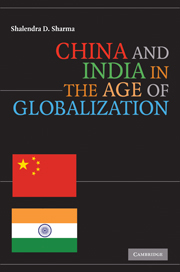Book contents
- Frontmatter
- Contents
- Acknowledgments
- Acronyms
- Political Map of China
- Political Map of India
- Introduction: China and India in the Age of Globalization
- 1 Prelude to Globalization: China (1949–1978) and India (1947–1991)
- 2 China and India Embrace Globalization
- 3 China: Strategies and Patterns of Global Integration
- 4 India: Strategies and Patterns of Global Integration
- 5 Sino-Indian Relations: Partners, Friends, or Rivals?
- 6 India and the United States: From Estrangement to Engagement
- 7 The Rise of China and Its Implications for the United States
- 8 China and India: Future Challenges and Opportunities
- Bibliography
- Index
7 - The Rise of China and Its Implications for the United States
Published online by Cambridge University Press: 22 January 2010
- Frontmatter
- Contents
- Acknowledgments
- Acronyms
- Political Map of China
- Political Map of India
- Introduction: China and India in the Age of Globalization
- 1 Prelude to Globalization: China (1949–1978) and India (1947–1991)
- 2 China and India Embrace Globalization
- 3 China: Strategies and Patterns of Global Integration
- 4 India: Strategies and Patterns of Global Integration
- 5 Sino-Indian Relations: Partners, Friends, or Rivals?
- 6 India and the United States: From Estrangement to Engagement
- 7 The Rise of China and Its Implications for the United States
- 8 China and India: Future Challenges and Opportunities
- Bibliography
- Index
Summary
Throughout much of her long history, China was the dominant power in Asia to which surrounding states paid homage and tribute. The Middle Kingdom saw itself as the center of progress, propriety, and righteousness – a bulwark against the uncivilized barbarity on its periphery. The collapse of the Soviet Union eliminated the major land-based threat to China, and its economic rise has enabled it once again to regain its earlier power and glory. Today, China's global influence and leverage rivals only the lone superpower – the United States. For the international community, and especially China's neighbors, the rise of a potentially Sinocentric world has prompted them to rethink and readjust their relations with Beijing by taking into account its interests and concerns in their foreign policies and diplomacy. Although some hope that China will play a greater role in world affairs (at least to balance the American “hyperpower”), most remain ambivalent – uncertain as to what China's emergence means to them and its implications for global stability and security.
Arguably, nowhere is this ambivalence more pronounced than in the United States. Although the United States remains the world's most powerful state, it also knows that its power and influence are neither limitless nor uncontested. To the United States, if there is a “peer competitor” on the horizon, it is China. Indeed, China's ambitious military modernization is fast transforming the country into a formidable power and a genuine strategic competitor to the United States.
- Type
- Chapter
- Information
- China and India in the Age of Globalization , pp. 211 - 247Publisher: Cambridge University PressPrint publication year: 2009



